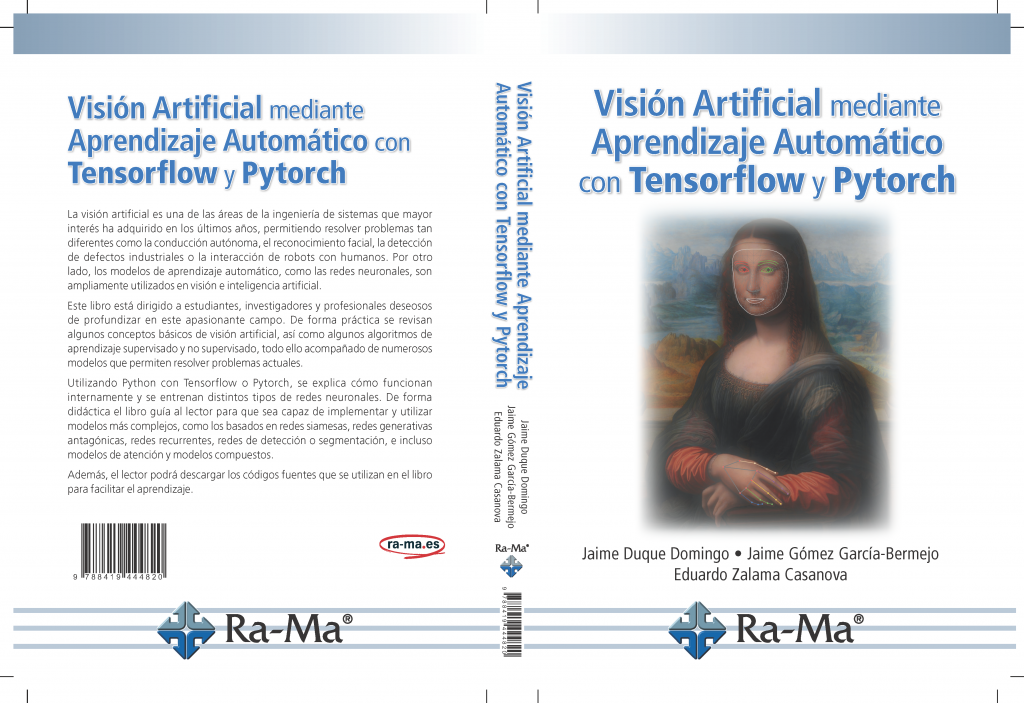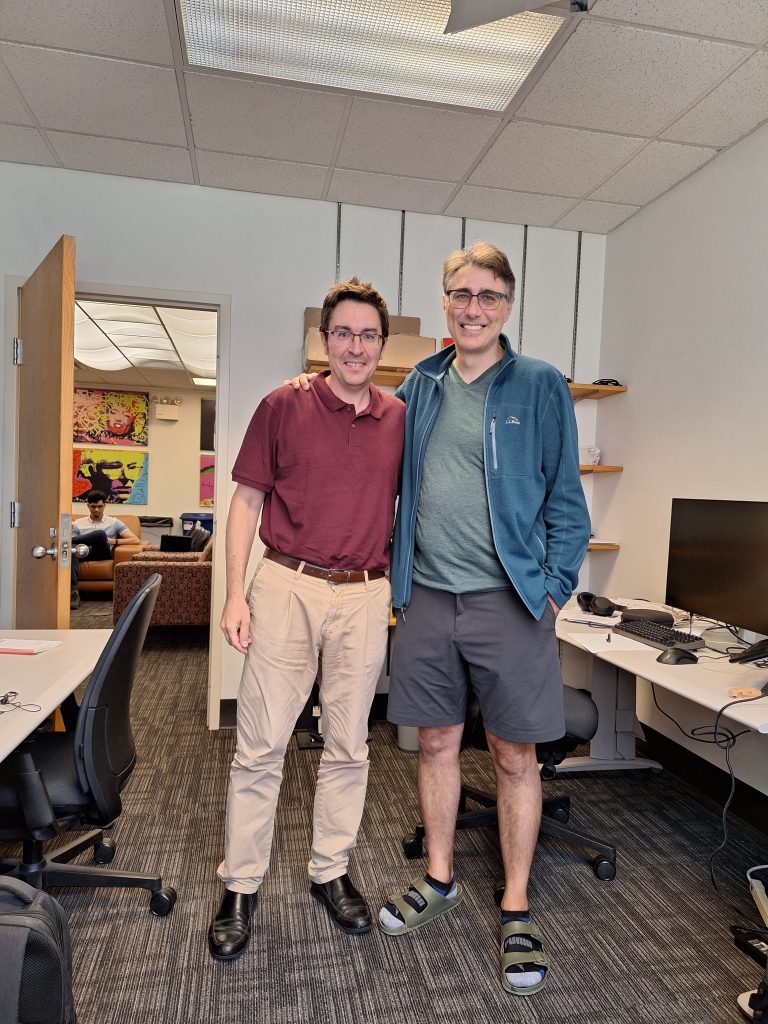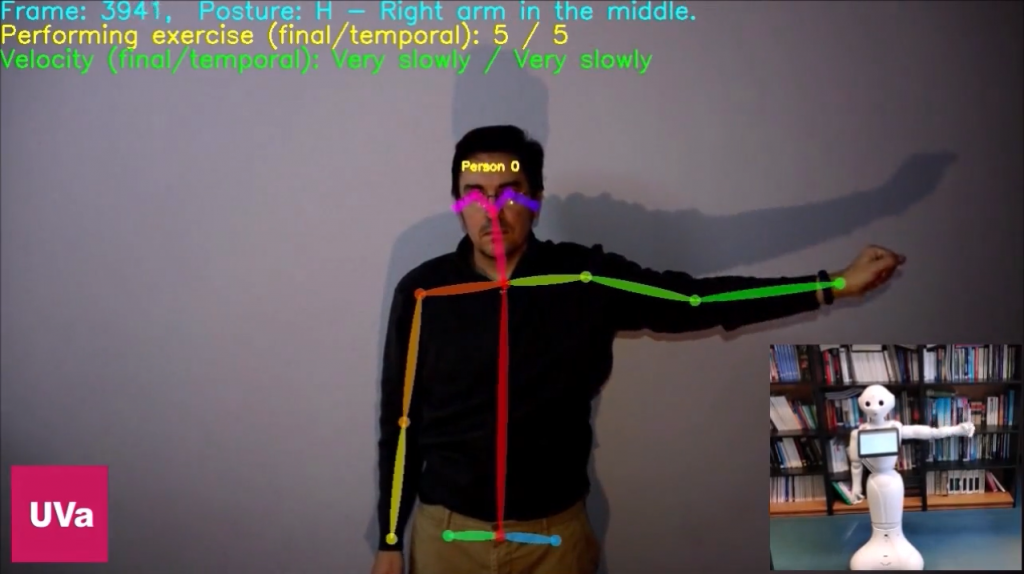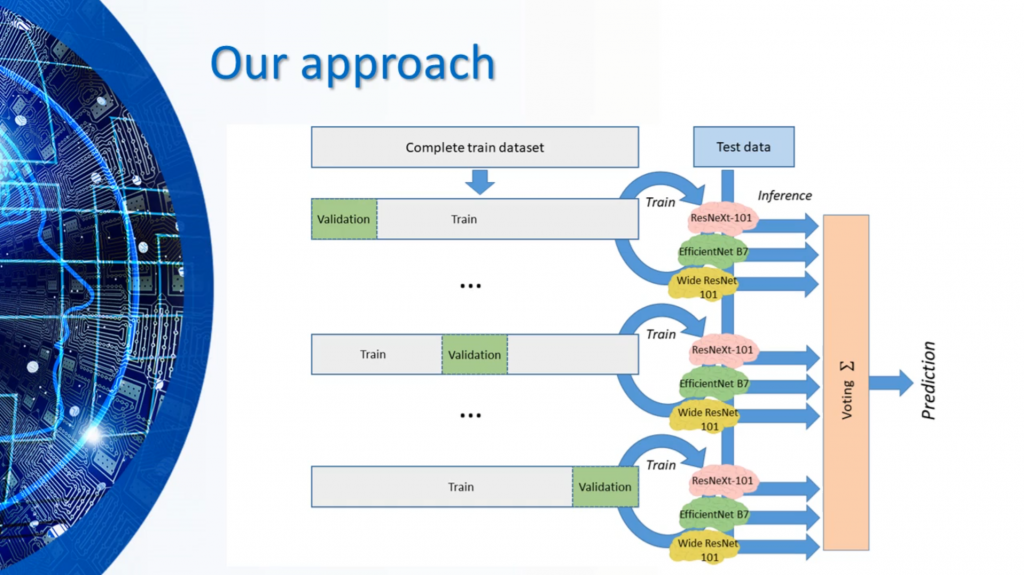
(Profesor en el Departamento de Ingeniería de Sistemas y Automática. Universidad de Valladolid)
e-Mail: jaime.duque@uva.es
Contact me on LinkedIn (Contacta conmigo a través de LinkedIn)
https://www.linkedin.com/in/jaime-duque-domingo-bb576565
Access my CV in Spanish (Accede a mi currículo):
https://cvn.fecyt.es/0000-0001-6649-5550
Access my CV in English:
Main research fields
Interested in computer vision, social and cognitive robotics, artificial intelligence, deep learning and activity recognition by means of sensors or computer vision.
Short Biography
Jaime Duque Domingo holds a PhD in Systems and Control Engineering from the UNED (2018), a Master’s Degree in Research in Software Engineering and Computer Systems from the UNED (2014) and a Master of Education (Mathematics) from the University Isabel I of Castilla (2018). He obtained a Bachelor’s Degree in Computer Engineering from the University of Valladolid (2011) and a Technical Engineering Degree in Computer Engineering from the same university in 2000. He obtained the qualification of Cum Laude in the defence of his doctorate and has obtained six awards in his research career, including the UNED Extraordinary PhD Prize, awarded in November 2020 and the only prize given by the School of Computer Science that year. For 18 years he worked on the development of complex IT projects for the private sector, both in Spain and abroad. He carried out projects in the insurance/banking field (Seguros Caja Duero), in the field of governmental applications (French Social Security through ATOS IT), European Commission (working in the IT Department of the Commission in Brussels – DIGIT), in the automotive sector (Renault, Valladolid) or projects of online sales applications (MachinePoint). In recent years, he has focused on the academic world, obtaining his PhD, participating in several national and international conferences, publishing several papers and teaching at universities. He has participated in five research projects, within the UNED, CARTIF and the University of Valladolid (2 currently). He has also published the book «Visión Artificial mediante Aprendizaje Automático con Tensorflow y Pytorch» in the RAMA publishing house, a chapter book about robotics and autism,15 articles in SCI-JCR indexed journals, in the first and second quartile, and 14 articles in national and international conferences. His field of activity focuses on artificial vision and robotics, specialising in deep learning techniques, social and cognitive robotics, and positioning systems. As a researcher, he has worked at the University of Valladolid and at the CARTIF Technology Centre. He has also been a visiting professor at Carnegie Mellon University (CMU) in Pittsburgh (USA). In relation to university teaching, he has been a professor at the University of Valladolid and at the European University Miguel de Cervantes (UEMC), teaching subjects such as «Fundamentals of Computer Science», «Computer Vision», «Computer Consulting», «Machine Learning Tools», «Fundamentals of Automatics» or «Information Systems». He is currently Assistant Professor at the Department of Systems Engineering and Automatics of the University of Valladolid. He is accredited as «Profesor Contratado Doctor» by ACSUCYL and ANECA.
Books
- Visión Artificial mediante Aprendizaje Automático con Tensorflow y Pytorch. Ra-Ma. (2023). ISBN: 978-84-19444-82-0. URL: https://www.ra-ma.es/libro/vision-artificial-mediante-aprendizaje-automatico-con-tensorflow-y-pytorch_146840/

Chapters in books:
- «Robótica, realidad virtual y tecnologías relacionadas para la detección, atención e intervención en TEA» en el libro «Autismo y Nuevas Tecnologías» de la editorial Ra-Ma. (2023). ISBN: 978-84-19857-99-6
Publications Q1-Q2 JCR Journals
- Development of a Human-Robot Interface for Cobot Trajectory Planning Using Mixed Reality. Electronics. 13 – 3, MDPI (2024). Posición: 131/275 (2,9) DOI: https://doi.org/10.3390/electronics13030571
- An Unsupervised Method to Recognise Human Activity at Home Using Non-Intrusive Sensors. Electronics. 12 – 4772, MDPI (2023). Posición: 131/275 (2,9) DOI: https://doi.org/10.3390/electronics12234772
- One Shot Learning with class partitioning and cross validation voting (CP-CVV). Pattern Recognition. 143, Elsevier (2023). Posición: 25/145 (8,0) DOI: https://doi.org/10.1016/j.patcog.2023.109797
- SDHAR-HOME: A Sensor Dataset for Human Activity Recognition at Home. Sensors(2022). Posición:14/64(3,576). DOI: 10.3390/s22218109
- Improving Human Activity Recognition Integrating LSTM with Different Data Sources: Features, Object Detection and Skeleton Tracking. IEEE Access (2022). Posición:94/273(3,671) DOI: 10.1109/ACCESS.2022.3186465
- Cross Validation Voting for Improving CNN Classification in Grocery Products. IEEE Access(2022). Posición:94/273(3,671) DOI: 10.1109/ACCESS.2022.3152224
- Improvement of One-Shot-Learning by Integrating a Convolutional Neural Network and an Image Descriptor into a Siamese Neural Network. Applied Sciences(2021). Posición:38/90(2,679). DOI:10.3390/app11177839
- Daily Human Activity Recognition Using Non-Intrusive Sensors. Sensors(2021). Posición:14/64(3,576) DOI:10.3390/s21165270
- Visual Recognition of Gymnastic Exercise Sequences. Application to Supervision and Robot Learning by Demonstration. Robotics and Autonomous Systems(2021). Posición:31/63(3,12). DOI:10.1016/j.robot.2021.103830
- Optimization and Improvement of a Robotics Gaze Control System using LSTM networks. Multimedia Tools and Applications (2021). Posición:120/273(2,757) DOI: 10.1007/s11042-021-11112-7
- Egyptian Shabtis Identification by Means of Deep Neural Networks and Semantic Integration with Europeana. Applied Sciences(2020). Posición:38/90(2,679) DOI:10.3390/app10186408
- Gaze control of a robotic head for realistic interaction with humans. Frontiers in Neurorobotics(2020). Posición: 69/139(3,272) DOI:10.3389/fnbot.2020.00034
- Integration of Computer Vision and Wireless Networks to Provide Indoor Positioning. Sensors(2019). Posición:15/64(3,275) DOI:10.3390/s19245495
- An improved indoor positioning system using RGB-D cameras and wireless networks for use in complex environments. Sensors(2017). Posición:16/61(2,475) DOI:10.3390/s17102391
- Deciphering Egyptian hieroglyphs: Towards a new strategy for navigation in museums. Sensors(2017). Posición:16/61(2,475) DOI:10.3390/s17030589
- Indoor Positioning System using Depth Maps and Wireless Network. Journal of Sensors(2016). Posición:126/262(1,704) DOI:10.1155/2016/2107872
Publications in Congresses
- Mejora en la clasificación de actividades mediante redes de convolución y CVV-SV. JREB, 2023. Madrid.
- Reconocimiento de actividades humanas aplicando modelos de Aprendizaje Profundo. JREB, 2023. Madrid.
- Sistema de monitorización no intrusiva para vivienda de personas mayores. JREB, 2023. Madrid.
- Teleoperación de un robot colaborativo mediante realidad virtual. JREB, 2023. Madrid.
- Sistema de monitorización no intrusiva para el reconocimiento de actividades de la vida diaria en entornos multiusuario. JREB, 2022.Málaga.
- Optimization of a Robotics Gaze Control System. WAF 2020.Madrid.
- Locating Multiple Camera Sensors and Wireless Access Points for a Generalized Indoor Positioning System. ICWMC, 2017.Niza (Francia)
- A Semantic Approach to Enrich User Experience in Museums Through Indoor Positioning.
UCAMI, 2017.Filadelfia (EEUU) - Mejoras en el algoritmo de posicionamiento en interiores mediante sensores RGB-D y redes WiFi. JNA 2018.Badajoz.
- A Vision-Based Strategy to Segment and Localize Ancient Symbols Written in Stone. Iberian Robotics Conference. 2017.Sevilla.
- Experiencias de Predicción para un Sistema de Posicionamiento de uso en Recintos de Interior basado en Cámaras 3D de Bajo Coste y Redes Inalámbricas. JNR 2017.Valencia.
- Indoor Positioning Prediction System based on Wireless Networks and Depth Sensing Camera. JNA 2016.Madrid.
- People Positioning System with Low Cost 3D Cameras and Wireless Devices for Indoor Environments. Robocity 2016.Madrid.
- Localización de personas mediante cámaras RGB-D y redes inalámbricas. JNA 2015.Bilbao.
Visiting professor
- Visiting Professor for 3 months at Carnegie Mellon University (CMU), Pittsburgh (USA) (2023).

Professor of different university subjects
- Fundamentals of Computer Science. University of Valladolid (2021/22 –> Currently)
- Fundamentals of Automatics. University of Valladolid (2022/23 –> Currently)
- Computer Vision. University of Valladolid (2021/22 –> Currently)
- Fundamentals of Machine Learning. UEMC university (2021/22)
- Information Systems. UEMC university (2019/20 to 2021/22)
- Computer Consultancy. UEMC university (2019/20 to 2021/22)
Directed TFGs (Trabajo Fin de Grado/End-of-Degree Thesis)
- «Aplicación de la visión artificial al ámbito biosanitario». Autor: Eva Luengo Gutiérrez. 19/9/2023. Tutores: Jaime Gómez García Bermejo, Jaime Duque Domingo
- «Monitorización de la actividad de personas mayores mediante técnicas de aprendizaje profundo». Autor: Celia Sánchez-Girón Coca. 13/7/2023. Tutores: Javier Pérez Turiel, Jaime Duque Domingo
- «Evaluación en línea del grado de involucración del usuario en actividades de interacción humano-robot». Autor: Mario Castañeda González. 19/10/2022. Tutores: Jaime Gómez García Bermejo, Jaime Duque Domingo
- «Desarrollo de un sistema de realidad mixta para robótica colaborativa». Autor: Raúl Calderón Sesmero. 06/03/2023. Tutores: Jaime Gómez García Bermejo, Jaime Duque Domingo
- «Teleoperación de un robot humanoide mediante gafas de realidad virtual». Autor: David Álvarez Gil. 10/03/2023. Tutores: Jaime Gómez García Bermejo, Jaime Duque Domingo
Tutored interships in companies
- Prácticas de A. Gregorio en Michelin: 2022-2023 (300 horas)
- Prácticas de E. Luengo en CARTIF: 2022-2023 (687 horas)
Some prizes
- Premio Michelin otorgado a Raúl Calderón Sesmero con el TFM ganador del Trabajo Fin de Estudios sobre Investigación (participo como tutor)
- Premio Innovadores 2022 Prize, awarded by Iberdrola and the newspaper El Mundo for the best University Research Project.
- Extraordinary Doctorate Prize of the UNED, awarded in November 2020.
- IARIA-ICWMC 2017. Best paper presented at the International Conference on Wireless and Mobile Communications (Nice, France, 2017)
- INFAIMON 2018, Best paper on computer vision presented at the Jornadas Nacionales de Automática (Badajoz, 2015)
- INFAIMON 2015. Best paper on computer vision presented at the Jornadas Nacionales de Automática (Bilbao, 2015)

Some videos of our work



